Lawmakers on Thursday passed a transgender rights bill allowing anyone 16 and over to change gender on their ID card, putting Spain on track to becoming one of the few countries to allow transgender people to change their status with a simple declaration.
Approved by 188 votes in favour to 150 against and seven abstentions, the bill now moves to the Senate where, if left unchanged as expected, it will become law within weeks.
The draft bill effectively simplifies the procedure for changing gender on a person’s national identity card, allowing them to request the change based on a simple statement.
The bill also proposes a ban on so-called conversion therapies to suppress sexual orientation or gender identity and would, if passed into law, establish fines and punishments for attacks on LGBTQ people.
It would also overturn a ban that prevented lesbian couples from registering their children under both parents’ names.
Transgender rights groups say the law represents a “before and after” in LGBTQ rights. But some feminist activists regard gender self-determination as a threat that blurs the concept of biological sex.
“We are making progress on rights as a country,” Equality Minister Irene Montero said during the debate leading up to the vote. “We want all LGBTI people to be able to be themselves, without closets.”
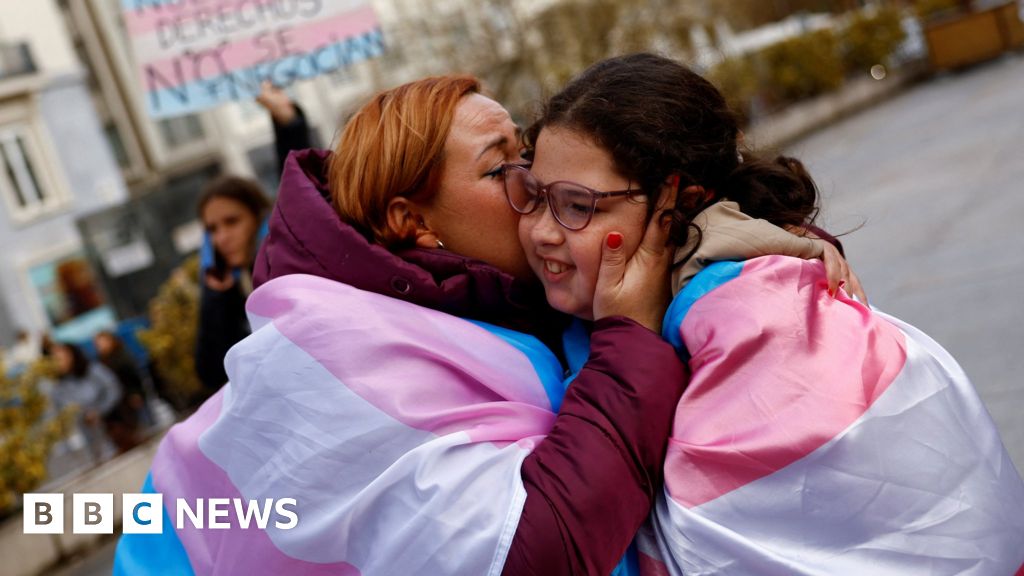
Outside the Congress building, dozens of activists in favour of the law and families of transgender people exchanged hugs and cheered in celebration after the vote, while some burned blue, white and pink flares – the colours of the transgender movement.
In Europe, Denmark was the first country to grant such a right in 2014. On Thursday, Scotland’s Parliament also passed reforms to make it easier for transgender people to change their legal gender, removing the need for an official medical diagnosis of gender dysphoria.
The bill has caused unease within the ruling coalition, with the far-left Unidas Podemos party, which sponsored it, accusing Prime Minister Pedro Sanchez’s Socialist party of attempting to torpedo the law, but ultimately the Socialists backed the legislation.
Joining those celebrating outside were Montero and former Socialist lawmaker Carla Antonelli, who had quit the party in protest over the delays in the legislative process.
Critics say the law will be open to abuse and could threaten women’s rights, allowing men who self-identify as women to compete in women’s sports or request transfers to women’s prisons. They have also raised concern about minors having the right to self-determine their gender.
sources:
A petition in Ukraine calling for same-sex marriage to be legalised has gained enough signatures for the president to consider the proposal.
The petition has more than 28,000 signatures, meaning President Volodymyr Zelensky now has 10 days to respond.
Homosexuality is not illegal in Ukraine, but same-sex marriages and civil partnerships are not recognised.
This has caused particular problems for LGBT people signing up for the military following Russia’s invasion.
For example, under Ukrainian law if someone in a same-sex relationship dies, their partner cannot collect their body or bury them.
The online petition says: “At this time, every day can be the last.”
One LGBT organisation has described the petition as an “important moment” for members of the community.
“It is important that LGBTQ people have the right to see their partner and take their body from the morgue, and seek compensation if needed,” Oksana Solonska, media communications manager at Kyiv Pride, told the BBC.
“All married couples have these rights. We really hope that same-sex marriage will be legalised, so people will be able to take care of each other,” she added.
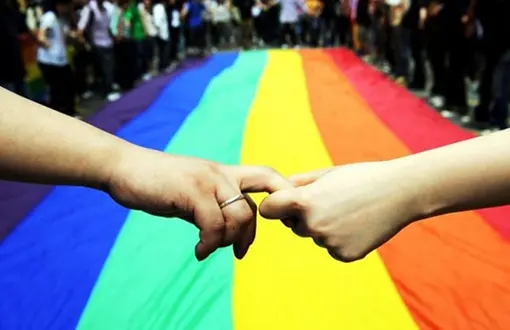
Any petitions in Ukraine that gather more than 25,000 signatures automatically trigger the president’s consideration. However this does not guarantee any changes to the current law, and it is not clear whether Mr Zelensky will move to legalise same-sex marriage.
While some efforts have been made to protect LGBT people in Ukraine – such as an anti-discrimination law that was introduced in 2015 – its LGBT community has suffered homophobia, intolerance and violence.
In 2013, the country’s first official Pride march was held in Kyiv despite protests – it was meant to happen the previous year, but was cancelled after a gathering of skinheads threatened participants.
And in 2018, activists were attacked at a Kyiv transgender rally by far-right militants.
But despite the risks, the Pride parade has grown in popularity, and last year more than 7,000 people took part in a march in the capital, organisers estimated.
According to a poll conducted by the Kyiv International Institute of Sociology in May, over the past six years, the number of people who have a “negative view” of the LGBT community has decreased from 60.4% to 38.2%.
sources:
Canadian health officials have removed a ban on blood donations from gay men, one that has long been condemned as homophobic.
The old rule prevented donations from men who have had sex with other men within three months of giving blood.
Health Canada called the move “a significant milestone toward a more inclusive blood donation system”.
Countries around the world have been lifting similar bans in recent years.
As of 30 September, prospective donors will not be asked about their sexual orientation during the screening process but instead about whether they engage in any higher-risk sexual behaviours.
The policy change comes after Canadian Blood Services, which collects blood and blood product donations across most of the country, submitted a request last year to scrap the rule to Health Canada, which announced it had approved it on Thursday.
Prime Minister Justin Trudeau’s Liberal party first made the promise to end the donation ban during the 2015 federal election campaign and has faced growing criticism for its failure to do so.
At a news conference on Thursday, Mr Trudeau said the change that was long overdue, calling the current approach “discriminatory and wrong”.
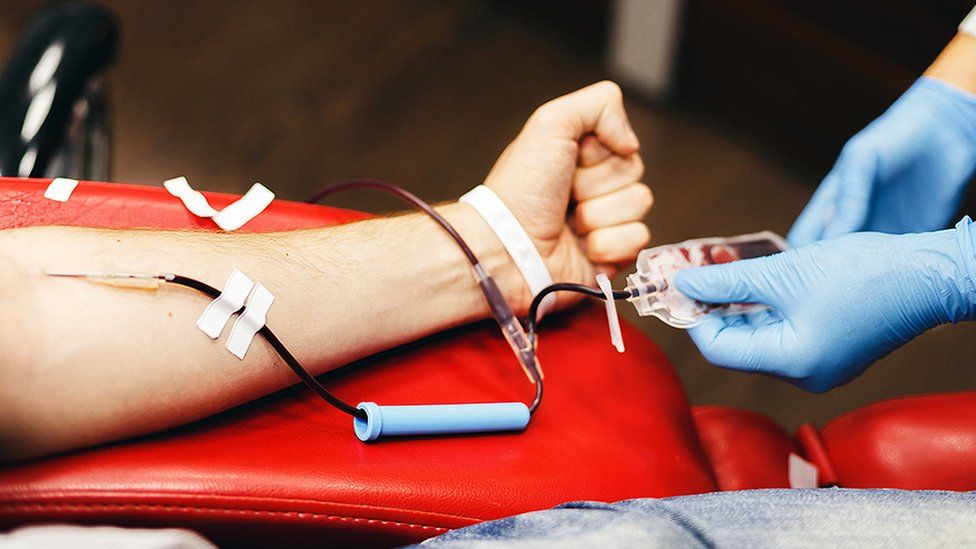
Many countries instituted similar donation bans during the Aids epidemic of the 1980s. Experts have found that the bans had little effect, since blood is now systematically screened in advance for viruses such as HIV and Hepatitis B and C.
The UK lifted its own three month ban on blood donations from gay men last year. France, Greece, Israel, Hungary, Denmark and Brazil have also recently lifted restrictions.
Facing a blood shortage due to the coronavirus pandemic, the US reduced its celibacy requirement for gay men from one year to three months in October 2020.
Dante Buu’s point of view is as unique as the pieces he’s producing for this year’s Venice Biennale.
His colourful embroideries are sculptural pieces affixed onto flexible metal rods which can be manipulated causing the pieces to change form. Buu himself is constantly morphing his forms of expression. Utilising video, performance art, photography, text, and textiles, Buu challenges notions of alienation, sexuality, intimacy, and identity.
His works will represent Montenegro at the 2022 ‘Olympics of the art world’.
“I am the first artist from a Muslim background to come out publicly as gay in the Balkans,” Buu states emphatically. “It’s a concept with specific wording that I use. Of course, there are others and I’m not denying their existence. It’s a question of making a declaration to the world.”
Hailing from Rožaje, which hugs the border with Serbia and Kosovo, Buu grew up feeling alone, due to his homosexuality and Muslim faith. Books and films were and still are his comfort.
His loneliness comes through in the photograph ‘If you wanna fuck me you don’t have to pretend it’s for art,’ in which a dapper Buu is enveloped by suited men offering to light his cigarette. It’s a direct reference to the film ‘Malèna’ by Guiseppe Tornatore in which Monica Bellucci’s character pulls out a cigarette and men clamour to light it. In that moment, she resolves to be a prostitute in order to survive. Malèna’s husband is allegedly killed at war, she’s financially strapped. It’s a sterling moment, in Buu’s eyes, of self-empowerment.
“Every human being in this world is relevant. There is no supremacy of anyone. Unfortunately, we live in a world where wealth dictates supremacy.”
Coming out to his parents aged 14, he credits the support of his family with buttressing his sense of self. Buu also spent some time in Sarajevo before obtaining an artist-at-risk scholarship from the Martin Roth Initiative, arriving in Berlin in 2021. He still goes home to Rožaje regularly.
“I come from two minorities in Montenegro. I was constantly harassed and bullied as a child. In fact, there’s no difference between children and adults in that way.”
Buu considers his existence as resistance to uniformity, a sentiment that is born out in his works.
“I’m standing up for myself considering my background and then, dealing with the art world which also has misuse and abuse of artists.”
After coming from the margins, Buu has garnered major fellowships and awards. He became an artist-in-residence in places such as KulturKontakt Austria and the Ankara Queer Art Program. This autumn he will join CEC ArtsLink in New Orleans.
Most recently, he was selected for one of the foremost contemporary art residencies in Germany, Künstlerhaus Bethanien in Berlin. Christoph Tannert, artistic director of the Künstlerhaus Bethanien, calls Buu’s art “true and beautiful.”
“He buries himself in the wounds of the soul,” notes Tannert “All he radiates is an almost tender humility that he shows to everyone who enters into dialogue with him.”
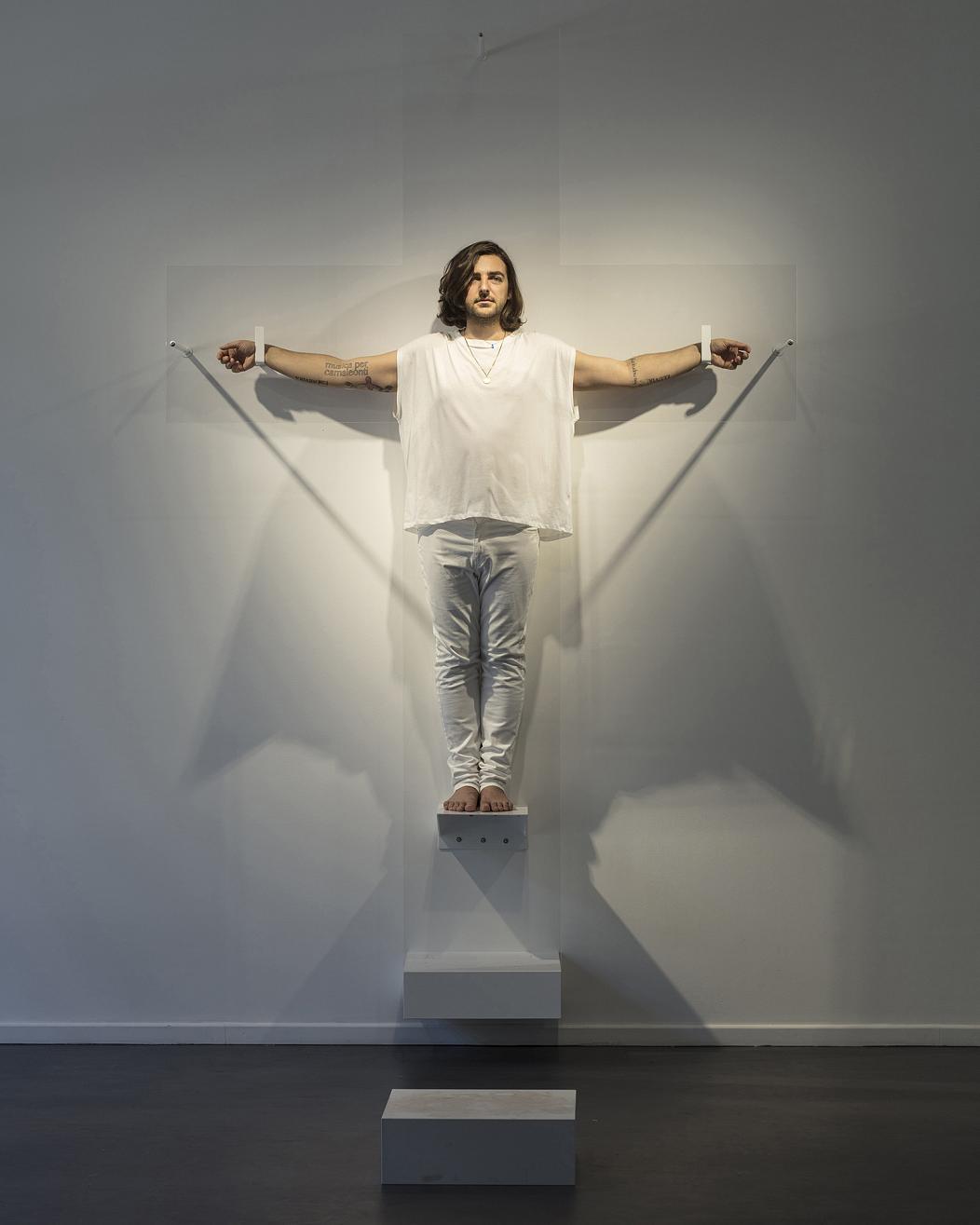
Buu’s performative works are meant to challenge our sense of intimacy as well as the art world’s focus on production and themes. He values durational performances because they aren’t just items to be bought or casually viewed without the artist present. For Buu, each performance is different, ineffable, impossible to duplicate exactly.
One of his most searing performances took place in 2015 at < rotor >, a center for contemporary art in Graz, Austria. Called The Winner Takes It All, it features Buu in front of a video singing in monotone the famous ABBA song with its melancholic harmony, backed by two videos spliced together: one shows gay men joyfully dancing in a New York nightclub and the other, in sharp contrast, is from a YouTube video of a group of Russian men beating up a gay man.
Five of Buu’s pieces will feature in Montenegro’s contribution at the Venice Biennale from April to November.
It’s been a tough journey from Rožaje to the Biennale, where Buu’s work will be in the international spotlight, but he remains steadfast, reluctant to cater to the mainstream.
“Artists often have to say they are influenced by so-and-so–from the canon of Western, European art by straight, male artists. But what is the history of art? It’s not that.
“It’s something we have been sold and it’s not the truth.”
source:
https://www.euronews.com
Elton ILIRJANI, the founder of The Headhunter, Karriera.al, Employment Equality Index, and People First, has been chosen as the first NFT Icon for the LGBTQ+ Community.
His values, support, and work toward the LGBTQ+ community have been acknowledged and made him the face of the first NFT for the LGBTQ+ community.
Pride icon is the largest and the first NFT for the LGBTQ+ community! For years, the LGBTQ+ community has fought for their rights for equality and visibility in the civic space.
The NFT industry is no different, and the LGBTQ community deserves representation. Pride Icons isn’t “just another NFT project”:
Its art pays tribute to legendary LGBTQ+ icons (like Elton ILIRJANI)
And they are committed to donating at least $1M USD to non-profit organizations that promote equality.
“We choose Elton to be one of our icons because he is fighting for the same values as we do in the project: equality!”
Elton created the Employment Equality Index for the LGBTQ+, pushing public and private sectors to adopt equal rights policies at the workplace in the Western Balkans.
A non-fungible token (NFT) is a non-interchangeable unit of data stored on a blockchain that can be sold and traded.
Types of NFT data units may be associated with digital files such as photos, videos, audio, and/or utilities and benefits.
Pride Icon” është NFT më e madhe dhe e para në botë për komunitetin LGBTQ+!
Për vite tëra komuniteti LGBTQ+ ka luftuar për të drejtat e tyre, baraza dhe vizibilitet në hapësirën njerëzore.
Industria NFT nuk bën përjashtim, dhe komuniteti LGBTQ+ meriton përfaqësim edhe në këtë platformë! “Pride Icons” nuk është thjesht “një tjetër projekt NFT”!
Arti i tij nderon dhe lartëson Ikonat Legjendare të komunitetit LGBTQ+ (si Elton ILIRJANI) dhe ky projekt është i dedikuar që të bëjo donacione me një minimum prej 1 milionë dollar amerikanë për organizatat jo fitimprurëse që promovojnë barazinë!
“Ne kemi zgjedhur Eltonin të jetë një nga ikonat tona sepse ai lufton për të njëjtat vlera që ka edhe ky projekt: Barazinë!”
Eltoni ka krijuar Indeksin e Barazisë në Punësim për personat LGBTQ+, duke motivuar sektorin privat dhe atë publik të adoptojnë politika të barazisë në vendin e punës në Ballkanin Perëndimor.
Një token jo i këmbyeshëm (NFT) është një njësi jo e këmbyeshme e të dhënave të ruajtura
në një zinxhir që mund të shitet dhe tregtohet. Llojet e njësive të të dhënave NFT mund të shoqërohen me skedarë dixhitalë si foto, video, audio dhe/ose shërbime dhe përfitime.
A senior Qatari leader overseeing security for the World Cup has told The Associated Press that rainbow flags could be taken from supporters
At the World Cup in Qatar later this year, rainbow flags might be taken from fans to protect them from possible violence over promoting LGBTQ+ rights, a Qatari official told The Associated Press.
Major General Abdulaziz Abdullah Al Ansari insisted that LGBTQ couples would be welcomed and accepted in Qatar for the Nov. 21-Dec. 18 FIFA showpiece despite same-sex relations remaining criminalized in the conservative Gulf nation.
But Al Ansari is against the overt promotion of LGBTQ freedoms as symbolized by the rainbow flag that FIFA and World Cup organizers had previously said would be welcome across Qatar’s eight stadiums.
“If he (a fan) raised the rainbow flag and I took it from him, it’s not because I really want to, really, take it, to really insult him, but to protect him,” Al Ansari told the AP. “Because if it’s not me, somebody else around him might attack (him) … I cannot guarantee the behavior of the whole people. And I will tell him: ‘Please, no need to really raise that flag at this point.’”
Al Ansari is director of the Department of International Cooperation and chairman of the National Counterterrorism Committee at the Ministry of Interior where he discussed World Cup planning for an hour with the AP.
“You want to demonstrate your view about the (LGBTQ) situation, demonstrate it in a society where it will be accepted,” he said. “We realize that this man got the ticket, comes here to watch the game, not to demonstrate, a political (act) or something which is in his mind.
“Watch the game. That’s good. But don’t really come in and insult the whole society because of this.”
The potential confiscation from supporters was condemned as “deeply concerning” by fan and anti-discrimination campaigners.
FIFA President Gianni Infantino said this week in Doha that “everyone will see that everyone is welcome here in Qatar, even if we speak about LGBTQ.”
Al Ansari said he is not telling LGBTQ fans to stay away from Qatar or warning them of facing prosecution.
“Reserve the room together, sleep together — this is something that’s not in our concern,” he said. “We are here to manage the tournament. Let’s not go beyond, the individual personal things which might be happening between these people … this is actually the concept.
Male homosexuality is punishable by a prison sentence in the Gulf Nation and same-sex marriages are not recognised by the government, meaning some supporters are uneasy about travelling to Qatar when the finals kick off in November.
“Here we cannot change the laws. You cannot change the religion for 28 days of World Cup.”
When it was pointed out that visiting fans and teams could take offense to the comments, Al Ansari said he did not view himself as being discriminatory.
“I am risking … a minority view against a majority,” he said. “We have to be close to the problem before it erupts and gets out of control. … If somebody attacks you, then I have to get involved and it will be too late.”
The FARE network, which monitors games for discrimination, called for the freedoms of fans to be respected at the World Cup.
“The idea that the flag, which is now a recognized universal symbol of diversity and equality, will be removed from people to protect them will not be considered acceptable, and will be seen as a pretext,” FARE executive director Piara Powar said. “I have been to Qatar on numerous occasions and do not expect the local Qatari population or fans visiting for the World Cup to be attacked for wearing the rainbow flag. The bigger danger comes from state actions.”
sources:
Lia Thomas became the first known transgender athlete to win the highest US national college title with victory in the women’s 500-yard freestyle.
Thomas, who swims for the University of Pennsylvania, secured the title in four minutes 33.24 seconds in Atlanta.
Virginia’s Emma Weyant, who won 400m individual medley silver at the Tokyo Olympics, finished 1.75secs behind in second while Erica Sullivan was third.
“It means the world to be here,” Thomas said in an interview with Elizabeth Beisel after the race.
Thomas, who declined to attend the NCAA-required postrace news conference, told Beisel she has been trying to tune out the distractions. “I try to ignore it as much as I can,” Thomas said. “I try to focus on my swimming, what I need to do to get ready for my races. And just try to block out everything else.”
After posting the nation’s top times in the 200 and 500 freestyle events in December at the Zippy Invitational in Akron, Ohio, Thomas garnered national attention.
With success has come criticism about whether trans women should be allowed to compete in women’s sports. Her face has been prominently displayed on Fox News and right-wing news sites critical of society’s changing views on sex and gender.
Some of her Penn teammates also have taken issue with her participation. Last month, an anonymous letter written on behalf of 16 of her 40 Penn teammates criticized what they saw as her “unfair advantage,” saying they supported her gender transition out of the pool but not necessarily in it.
In response, more than 300 current and former swimmers, collegiate and elite, signed their names to an open letter defending Thomas’ ability to compete. One of those signees was Sullivan, her closest competitor in the 500 free prelim Thursday.
Thomas previously told the SwimSwam podcast she realized she was trans the summer of 2018, but kept it secret, wary that coming out would take away her ability to swim.

“I was struggling, my mental health was not very good. It was a lot of unease, about basically just feeling trapped in my body. It didn’t align,” she said.
The NCAA currently requires trans women athletes to have one year of hormone replacement therapy (HRT) to be cleared to participate in women’s sports. Thomas said she started HRT in May 2019 and came out as trans that fall, and the NCAA has approved her participation in the women’s field.
She swam for the Pennsylvanian men’s team for three seasons before starting hormone replacement therapy in spring 2019.
The National Collegiate Athletic Association Division I is the highest level of intercollegiate athletics in America.
US swimming updated its policy in February to allow transgender athletes to swim in elite events, alongside criteria that aims to reduce any unfair advantage.
On Saturday, swimmer Lia Thomas placed last in the 100-yard freestyle swim during the NCAA championships, ending her career in collegiate swimming. A last-place showing at an NCAA swim meet, even a championship one, would not typically garner national headlines. Yet, Thomas has been at the center of controversy regarding her eligibility to compete in women’s events.
sources:
Finland’s former interior minister has gone on trial in Helsinki accused of inciting anti-LGBT+ hate speech.
Prosecutors accuse Paivi Rasanen of making derogatory comments on three occasions, including in a 2019 tweet showing verses from the Bible.
Paivi Rasanen, a former interior minister and Christian Democrats leader, denies all four charges of incitement against a minority group, which relate to a radio show appearance and online writings about same-sex relationships.
Rasanen described homosexuality as a “psychosexual developmental disorder” and said that homosexual people are “dysfunctional”.
One charge related to a June 2019 tweet in which the long-time parliamentarian criticised the Finnish Lutheran church for partnering with that year’s Pride celebrations, accusing the organisation of “elevating shame and sin to a subject of pride”.
The tweet was accompanied by a picture of a Bible passage describing homosexual acts as “shameful” and “unnatural”.
Prosecutors say that her remarks are an “affront to the equality and dignity of homosexuals” and have called for the MP to be fined up to €13,000.
A group of supporters had gathered outside Helsinki District Court on Monday morning, where Rasanen arrived carrying a bible.
She told waiting media she felt “honoured to be defending freedom of speech and religion.”
“I hope that today it can become clear that I have no wish to offend any group of people, but this is a question of saving people for eternal life,” Rasanen said.
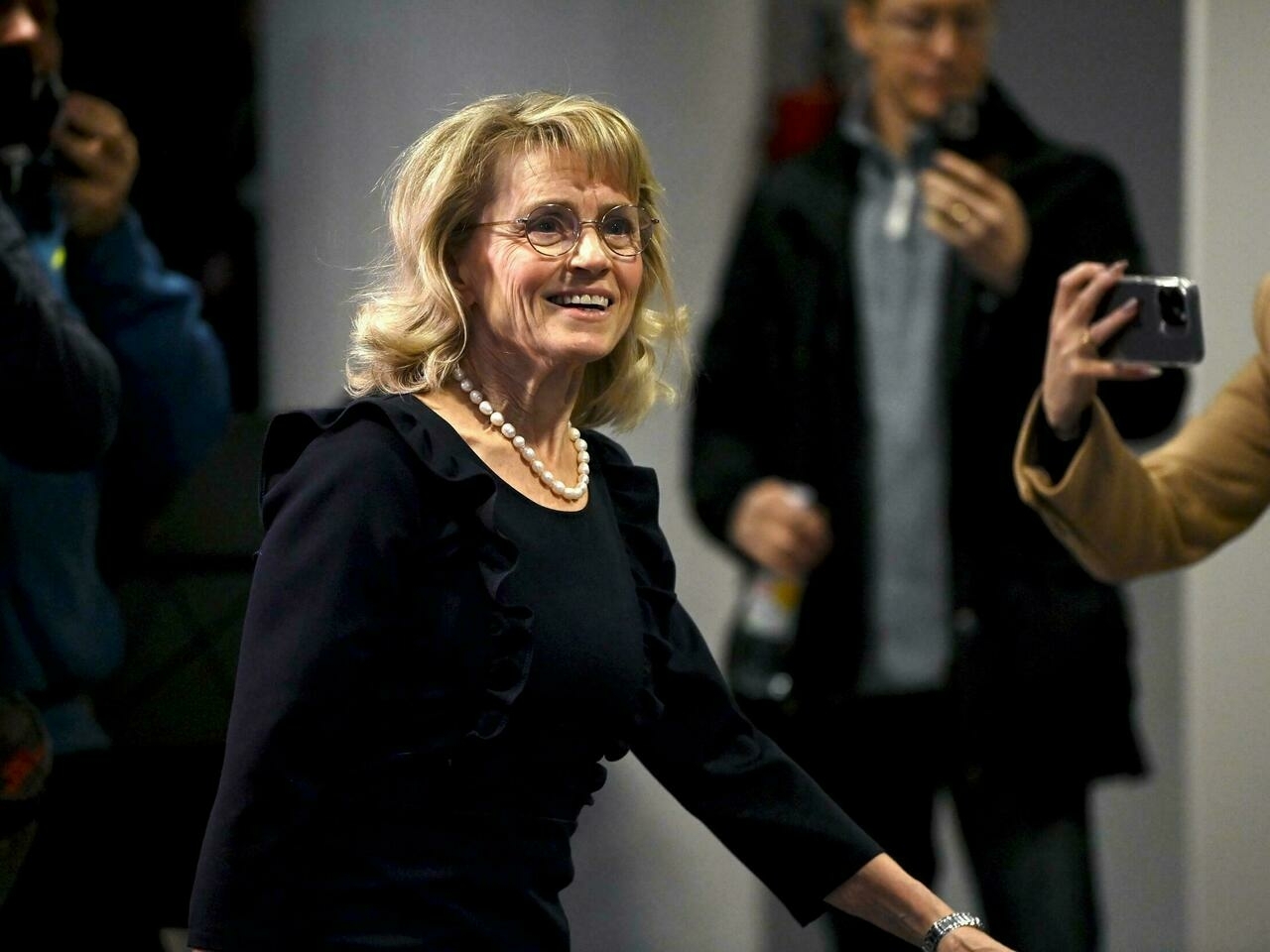
Bishop Juhana Pohjola is also charged with incitement to hatred for publishing Räsänen’s remarks on the website of the Luther Foundation of Finland.
The landmark case on hate speech and religious freedoms has been described as “shocking” by Finland’s Christian community.
The former minister has denied the charges and says she acted in the name of “freedom of expression and religion”.
“I hope it will be clear today that I do not wish to offend any group of people, but that it is about saving people for eternal life,” she told reporters.
The 62-year-old served as Finland’s interior minister from 2011 to 2015 and was also chairwoman of the Christian Democrats party. While in office, Räsänen actually passed the current Finnish law on incitement to hatred.
Finland has a population of about 5.5m people. The Evangelical Lutheran Church of Finland is one of the country’s two national churches and says it has about 4 million members.
The small opposition Christian Democrats party won just 3.9 per cent of the votes in Finland’s last parliamentary elections in 2019.
sources:
Pope Francis on last Wednesday called on parents around the world to not condemn children if they are gay.
In speaking about how parents should always stand by their children during difficult times, including illness or accidents, the pope said parents should also accompany “children with different sexual orientations.”
“Never condemn your children,” he said.
Francis made the comments while speaking about the biblical figure Joseph during his weekly general audience. He addressed parents facing difficult situations in the lives of their children, such as kids who are sick, imprisoned or killed in car accidents.
But he also addressed parents “who see that their children have different sexual orientations, how they manage that and accompany their children and not hide behind a condemning attitude.”
The pope shared this message during his general audience address, during which he said “God does not promise us we will never have fear. But with his help, it will not be the criteria of our decisions.” Prayer, he said, will bring light and peace, and he gave that advice to parents going through “sorrow.”
While the LGBTQ community has long been marginalized in many religions, including Catholicism, Pope Francis has had more progressive views on same-sex relationships.
In 2020, he endorsed civil unions for the first time as pontiff while being interviewed for the documentary “Francesco.”
“Homosexual people have the right to be in a family. They are children of God,” Francis said in the film. “You can’t kick someone out of a family, nor make their life miserable for this. What we have to have is a civil union law; that way they are legally covered.”
Last year, the Vatican’s doctrinal office issued a document saying that Catholic priests cannot bless same-sex unions, a ruling that greatly disappointed gay Catholics.
In some countries, such as the United States and Germany, parishes and ministers had begun blessing same-sex unions in lieu of marriage, and there have been calls for bishops to de facto institutionalize these.
Conservatives in the 1.3 billion-member Church have said the pope — who has sent notes of appreciation to priests and nuns who minister to gay Catholics — is giving mixed signals on homosexuality, confusing some of the faithful.
Last month, a Vatican department apologized for “causing pain to the entire LGBTQ community” by removing from its website a link to resource material from a Catholic gay rights advocacy group in preparation for a Vatican meeting in 2023 on the Church’s future direction.
The Church teaches that gays should be treated with respect and that, while same-sex acts are sinful, same-sex tendencies are not.
sources:
It all started in 2014, when a bakery in Northern Ireland refused to make a cake with a slogan supporting same-sex marriage.
The bakery came to wider prominence in July 2014 when it emerged that it had declined an order in its Belfast branch from gay rights activist Gareth Lee.
He had wanted them to make a cake that included a slogan that said “support gay marriage” along with a picture of Bert and Ernie from Sesame Street, and the logo of the Queerspace organisation.
At the time, same-sex marriage was still illegal in Northern Ireland, but the law has since changed and same-sex weddings have been taking place since February 2020.
The cake was being commissioned for a civic event in Bangor, County Down, to mark International Day Against Homophobia and Transphobia.
Staff at the bakery passed the order to its head office, which considered it to be “at odds” with their beliefs.
Another bakery agreed to accept the order.
The customer who placed the order with Ashers complained to Northern Ireland’s Equality Commission, and the watchdog took up the case, warning the company it had allegedly discriminated against the man on the grounds of his sexual orientation.
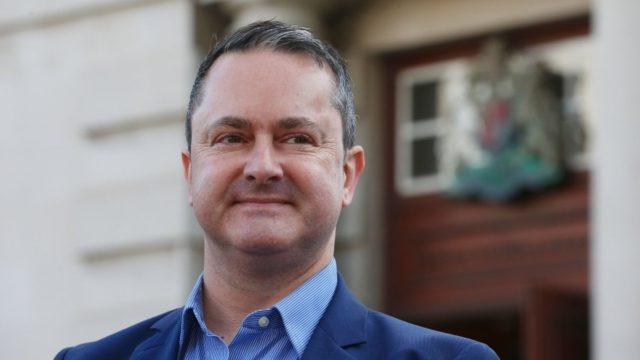
The commission supported Mr Lee in taking his legal case alleging discrimination.
However, Ashers said it was taking a stand on the grounds of religious freedom.
The bakery’s stance was backed by the Christian Institute, which provided legal assistance.
The court case in Belfast ran for three days in March 2015.
During the hearings, a lawyer for the bakery argued the issue was “the cake, not the customer”.
One of the bakers, Karen McArthur, said she did not know Mr Lee was gay and it would not have mattered as they would not have been prepared to make a cake with a pro-same-sex marriage slogan for anyone.
However, Mr Lee said he felt he was discriminated against.
He said that after ordering the cake and paying for it, only to be told two days later that his order had been rejected: “It made me feel unworthy, a lesser person.”
While the debate leading up to the hearing had been often heated, the BBC’s Mark Simpson found that in the courtroom it was a different story, and there was “no heckling, shouting or jeering”.
The judge found in favour of Mr Lee, saying that as a business, Ashers was not exempt from discrimination law.
District Judge Isobel Brownlie said Ashers was “conducting a business for profit” and it was not a religious group.
The firm was found to have discriminated against Mr Lee on the grounds of sexual orientation as well as his political beliefs.
The judge said she accepted Ashers had “genuine and deeply held” religious views, but said the business was not above the law.
Damages of £500 were agreed in advance by legal teams on both sides of the dispute.
In October 2016, the owners of the bakery lost their appeal against the ruling that their refusal to make a “gay cake” was discriminatory.
Appeal court judges said that, under law, the bakers were not allowed to provide a service only to people who agreed with their religious beliefs.
Reacting to the ruling, Daniel McArthur from Ashers said he was “extremely disappointed” adding that it undermined “democratic freedom, religious freedom and free speech”.
The firm then took the case to the Supreme Court and they won.
The UK’s highest court ruled the bakery’s refusal to make a cake with a slogan supporting same-sex marriage was not discriminatory.
Then president of the Supreme Court, Lady Hale, ruled the bakers did not refuse to fulfil the order because of the customer’s sexual orientation.
“They would have refused to make such a cake for any customer, irrespective of their sexual orientation,” she said.
“Their objection was to the message on the cake, not to the personal characteristics of Mr Lee.”
And from there, Mr Lee took his case to Europe, arguing the UK Supreme Court “failed to give appropriate weight” to his case under the European Convention of Human Rights.
